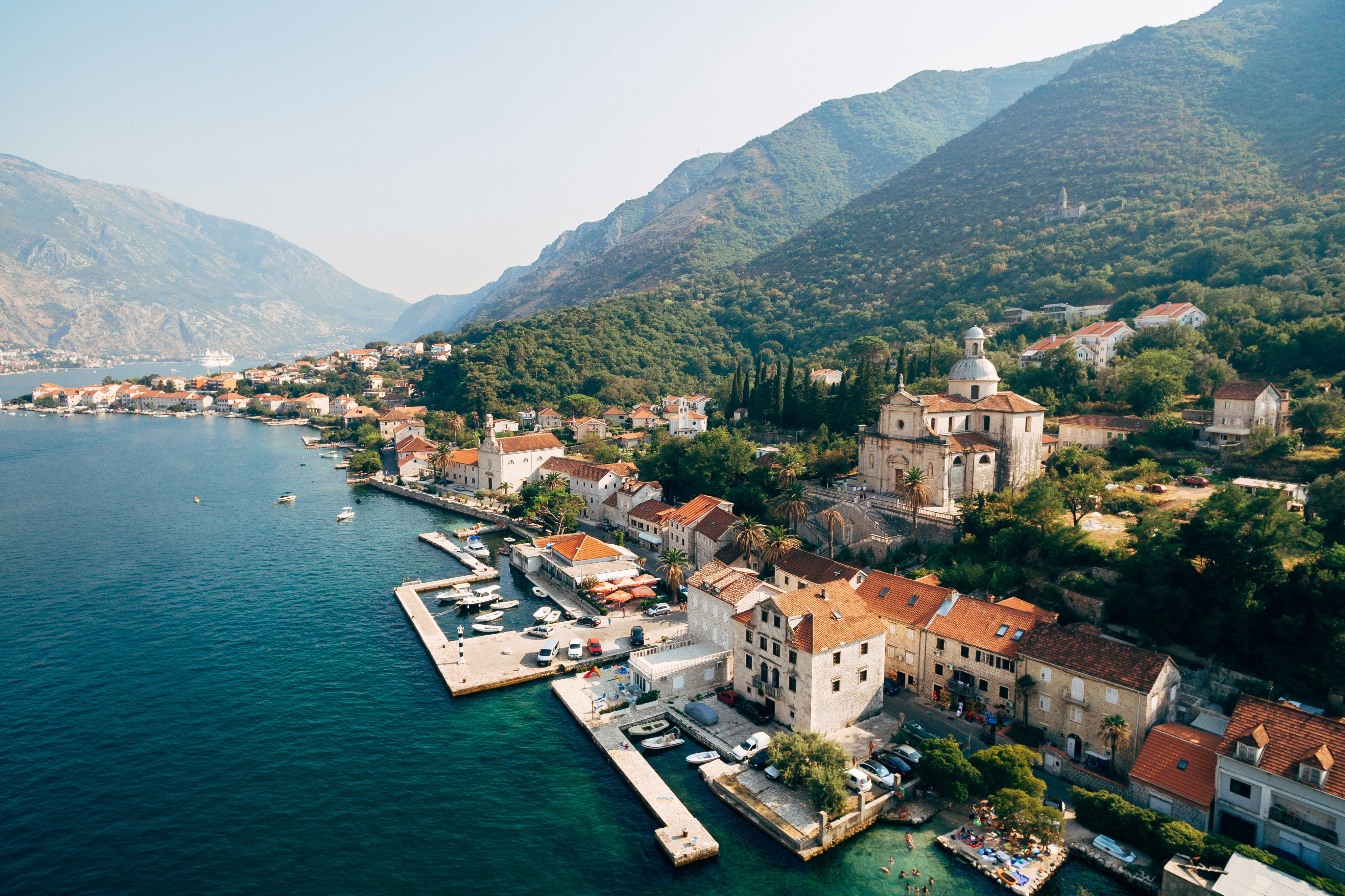Education in state educational institutions of Montenegro is free for everyone. To be enrolled in school, a child must provide a certificate from the pediatrician and pass an interview, to enter a university – pass exams and confirm the knowledge of Montenegrin language. A student takes 18 years to complete the full cycle from first grade to graduation from university.
The education system in Montenegro
As in the CIS countries, the educational system in Montenegro consists of four levels. Detailed information about each of them is given in the table below.
| Level of education | Sub-level | Age (years) |
|---|---|---|
| Preschool | Nursery | 1–3 |
| Kindergarten | 3–6 | |
| Secondary education | Primary School | 6–9 |
| Secondary School | 9–12 | |
| High School | 12–15 | |
| Secondary vocational | Gymnasium, college | 14–18 |
| Higher education | Bachelor’s degree | 18-22 |
| Master’s degree | 22–24 | |
| Doctoral degree | 24–26 |
There are 162 state elementary schools and 5 private, 51 state and public-private secondary schools and 5 private, as well as international schools and educational centers. Foreigners enter Montenegrin educational institutions on the same rights as the citizens of the country. Officially the lessons are conducted in the state language, but they can also be in Serbian, Albanian, Croatian and Bosnian.
The curriculum is based on the Bologna system. There is no certificate competition for admission to university – it is necessary to pass exams. Diplomas of higher education are in English and Montenegrin and are recognized on the territory of Europe.
Preschool education in Montenegro
Preschool education in the country is represented by nurseries, which accept children from one year old, and kindergartens, which are attended from the age of 3 to 6 years. Parents can choose any institution according to their place of residence.
Here is a list of documents required for registration:
- application;
- birth certificate;
- an abstract from the mother’s or father’s employment;
- residence permit for the child;
- passport of the parent;
- a health certificate from a pediatrician.
The main costs of maintaining the children are covered by the state, but parents still have to pay a certain amount (about 50 EUR per month). In kindergartens, children are not taught to read, write or count – this is the task of the school. In preschool, the child plays, learns about the world and develops his/her creativity.
Secondary education
This level of education is compulsory in Montenegro: schools compile lists of parents who have not sent their children to school and pass them to the Ministry of Education. Children are accepted from 6 years old, but it is possible to try from the age of 5, especially if the child is developed beyond his/her years. A psychologist and director will talk to a five-year-old candidate. It is necessary to choose a school in Montenegro according to the place of registration.
To enroll, you need to provide a health certificate from a pediatrician, a birth certificate with a translation into Serbian, a passport and a residence permit for the child. You will also have an interview with representatives of the school. If the student transfers from the school in the home country, in addition you must provide a personal file from the previous place of education in three copies with a translation into Serbian.
The first grade is considered preparatory, so children are tutored by a teacher. The whole process aims to foster a love of learning in the child. Pupils learn Montenegrin, Serbo-Croatian and English, and from the 6th grade they can choose an additional foreign language (French, Italian, German). Natural and exact sciences, fine arts are also taught. In addition, children can attend sports, art studios, clubs for free.
Education in Montenegrin public schools does not require large expenses from parents. According to the «Law on Amendments to the Law on Primary Education» from May 27, 2021, the textbooks are free for pupils.
After graduation, it is possible to study in a gymnasium or in a vocational school. Gymnasiums are chosen by those who want to go to higher education, which takes 3-4 years. Students who are enrolled in a technical school, in 2-3 years will receive a specialty and already be able to look for a job and get a job.

Higher education in Montenegro
The educational process in the country’s universities is based on the Bologna Process (ECTS). Students can obtain a Bachelor’s (in 3-4 years), Master’s or Doctoral degree (in 2 years). Universities accept applicants based on passing entrance exams. Results in three to five subjects are usually assessed. Study programs are divided into two streams: academic and applied. The former can lead to doctoral studies, for the latter the master’s degree is the last stage. All students at public and private universities are entitled to scholarships and dormitory accommodation.
The top universities in Montenegro for international students
Higher education in Montenegro after the 11th grade can be obtained in only three universities, one of them is public, the other two are private. The enrollment is full-time, there is no distance learning in universities, but because of the pandemic, some institutions offer classes remotely.
The list of universities in Montenegro, ordered by popularity among applicants, is shown below:
- University of Montenegro. State university, located in Podgorica. Some of the 19 faculties operate in other cities, e.g. music faculty in Cetinje, philosophy faculty in Niksic. Students can study medicine, economics, electrical engineering, history or other faculties. The Bachelor’s and Master’s degrees are free, but the number of budgetary places is limited and is determined by the state.
- Doña Gorica. A private university, operating since 2010 and located in the capital of the country. The university consists of 13 academic units, including faculties of arts, food technology, and sports management.
- Mediteran. The first private university founded in 2006. It has a total of 6 faculties, 5 of which are located in Podgorica and 1 in the city of Bar. The university offers Bachelor’s degree programs (9 fields of study), Master’s degree programs (11) and Doctoral degree programs (2).
In addition to universities, there are separate academic units with a narrow focus. The most popular are the Faculty of Business Administration in Bar, where banking, financial management, business psychology and other subjects are taught, and the Faculty of Administrative and European Studies in Podgorica, where students study international law, economics and public administration.
What’s the best way to enter a university for an applicant
Depending on the educational institution in Montenegro, the admission procedure may differ.
The general process consists of the following steps:
- Preparatory language program. You can choose a remote form of preparation (via Skype and other services) or a mixed form: the first half is done remotely, the second half is done in person in Montenegro.
- Preparation and submission of documents. The applicant needs to translate and certify the documents and then submit their scanned copies to the institution. You can send the application on the website of the university or on the website of the Ministry of Education, Science, Culture and Sports of Montenegro. After submitting the application, the applicant will receive a letter of confirmation. The admission campaign usually takes place from June to August.
- Application review and admission exams. The Admissions Committee reviews the application of the candidate and his/her package of documents. If there are no problems, the applicant will receive notification that the application has been processed and a letter with instructions on how to send in original documents and take the exams. The subjects and their number depend on the chosen profession; as a rule, up to 5 exams are required.
- Visa and residence permit. After the university enrollment the foreigner needs to get the visa type D in the Consulate of Montenegro in the country of residence and apply for residence permit on arrival in the country for legal long-term stay.
Documents for admission to a Montenegrin university
The applicant must apply and provide the following list of documents:
- the certificate of secondary education;
- a certificate of passing the final exam;
- birth certificate or passport;
- certificate of citizenship.
One can also submit certificates and diplomas with which the applicant has been awarded. If the applicant plans to enroll for a master’s or doctoral degree, a diploma and a certificate of nostrification must be submitted instead of the certificate. For a complete list of documents, check the website of the chosen institution.
Tuition fees in Montenegro
Unlike public institutions, which provide free education for citizens and immigrants, in private institutions you have to pay. The table below shows the approximate cost of education in private educational institutions of Montenegro.
| Type of institution | Cost per year, € |
|---|---|
| Kindergarten | 3 600 |
| School | 4 800 |
| University | 1500 (bachelor’s degree) 2000 (master’s degree) 3000 (doctoral degree) |
It is also worth considering other costs: accommodation, food, etc. The cost of renting a one-room apartment on average in Montenegro is about 150-300 EUR per month. Including the payment for housing, you will need about 700-800 EUR for monthly expenses. Students have the opportunity to work in their spare time, the best students receive scholarships.
For whom and why studying in Montenegro is a great option
Education in the country is at European level, diplomas are recognized in Europe and allow you to apply for a well-paid job. The cost of education in private universities is not as high as in Germany or France, and you can study for free at public institutions. Getting an education can be a milestone on the path to citizenship for Montenegro, which plans to join the EU. It is also possible for a graduate of a local institution of higher education to move to a European country for employment and eventually obtain an EU passport there.
Getting education in Montenegro schools and universities is suitable for those who are planning to live in Montenegro or other European countries. To greatly facilitate the process of moving, enrollment and legal stay in Montenegro, one should consult a highly specialized immigration lawyer.















This blog post offers a thorough overview of Montenegro’s education system, providing valuable thoughts for anyone considering studying or relocating there. I appreciate the detailed breakdown of various educational levels and the focus on quality and accessibility. It’s a great resource for understanding the country’s commitment to education. Thank you for sharing this informative piece.